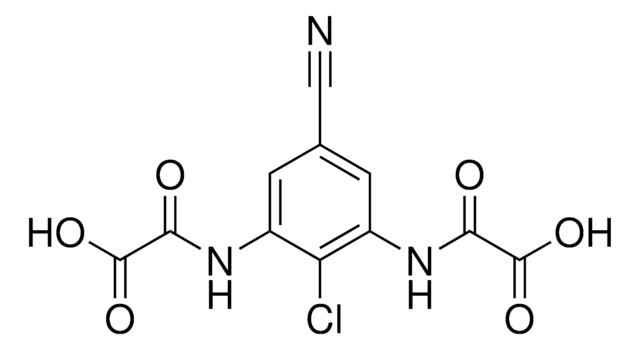SML0423
ML194
≥98% (HPLC)
Synonym(s):
1-(2,4-Difluorophenyl)-5-[[2-[[(1,1-dimethylehyl)amino]thioxomethyl]hydrazinylidene]methyl]-1H-pyrazole-4-carboxylic acid methyl ester, CID-9581011, CID9581011, Methyl 5-[(E)-(tert-butylcarbamothioylhydrazinylidene)methyl]-1-(2,4-difluorophenyl)pyrazole-4-carboxylate
About This Item
Recommended Products
Quality Level
Assay
≥98% (HPLC)
form
powder
storage condition
protect from light
color
white to beige
solubility
DMSO: 15 mg/mL (clear solution)
storage temp.
−20°C
SMILES string
COC(=O)c1cnn(-c2ccc(F)cc2F)c1\C=N\NC(=S)NC(C)(C)C
InChI
1S/C17H19F2N5O2S/c1-17(2,3)22-16(27)23-20-9-14-11(15(25)26-4)8-21-24(14)13-6-5-10(18)7-12(13)19/h5-9H,1-4H3,(H2,22,23,27)/b20-9+
InChI key
CYNLZIBKERMMOA-AWQFTUOYSA-N
Biochem/physiol Actions
Features and Benefits
Storage Class Code
11 - Combustible Solids
WGK
WGK 3
Flash Point(F)
Not applicable
Flash Point(C)
Not applicable
Certificates of Analysis (COA)
Search for Certificates of Analysis (COA) by entering the products Lot/Batch Number. Lot and Batch Numbers can be found on a product’s label following the words ‘Lot’ or ‘Batch’.
Already Own This Product?
Find documentation for the products that you have recently purchased in the Document Library.
Articles
Heterotrimeric G proteins modulate intracellular signals from 7TM receptors, impacting various cellular functions and drug targets.
Heterotrimeric G proteins modulate intracellular signals from 7TM receptors, impacting various cellular functions and drug targets.
Heterotrimeric G proteins modulate intracellular signals from 7TM receptors, impacting various cellular functions and drug targets.
Heterotrimeric G proteins modulate intracellular signals from 7TM receptors, impacting various cellular functions and drug targets.
Our team of scientists has experience in all areas of research including Life Science, Material Science, Chemical Synthesis, Chromatography, Analytical and many others.
Contact Technical Service








